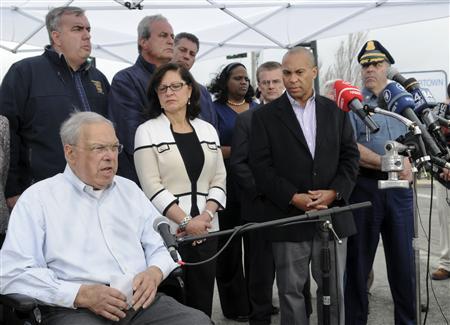Federal prosecutors may seek the death penalty for the surviving suspect in the Boston Marathon bombings, legal experts said on Sunday, though they cautioned that much will hinge on what emerges in the weeks ahead about him and his role in the attacks.
Dzhokhar Tsarnaev, 19, is in custody and in serious condition at a Boston hospital. Authorities are preparing to file charges against him in a case that has riveted national attention and that presents legal and political challenges.
Tsarnaev and his brother, Tamerlan Tsarnaev, 26, are suspected of setting off bombs at the crowded finish line of the marathon on Monday, killing three people and injuring 176. Tamerlan died early Friday after a shootout with police.
On television talk shows on Sunday, two Democratic senators, Dianne Feinstein of California and Charles Schumer of New York, advocated for federal prosecutors to seek the death penalty.
The decision on whether to do that or not could take weeks, experts said, as both prosecutors and defense attorneys present factors in favor of and against it.
"Just because it's a notorious case, doesn't mean they'll end up seeking the death penalty," said Peter Quijano, a criminal defense lawyer in New York City with extensive experience in capital cases.
If Tsarnaev is charged with a federal crime that is eligible for the death penalty, the U.S. attorney's office in Massachusetts will decide whether to recommend seeking the death penalty. Many mitigating factors will enter into that.
"His age, his apparent history of no involvement with the criminal justice system ... Also, he does not appear to have been the main mover. He does appear to have been following his brother," Quijano said.
Prosecutors must also consider evidence showing the crime was premeditated and the number of people hurt or killed.
Decision for main justice
While local prosecutors will make a recommendation, and defense attorneys will weigh in, the ultimate decision will land on the desk of U.S. Attorney General Eric Holder and his deputies at the Department of Justice in Washington, D.C.
Such decisions carry political consequences, particularly in high-profile cases, legal experts said.
Michael Chertoff, former secretary of the Department of Homeland Security under President George W. Bush, said the Justice Department will be cautious and "make a decision based on the appropriate factors, not on what people on the sidelines are getting on TV and urging them to do."
He added: "If someone commits an act of terror and kills Americans, my assumption is generally that there's a significant likelihood they will face the death penalty, unless there's some factor that makes it inappropriate or difficult."
A complicating factor might be whether Tsarnaev or his brother had any connection to an outside international group. If so, and Tsarnaev has valuable information, prosecutors might take the death penalty off the table as part of a plea bargain.
Not the first time
If the government does pursue capital charges, it would not be the first time it has done so in a high-profile case involving what authorities have called an act of terrorism in the United States.
Since the United States reinstated the federal death penalty in 1988, only three prisoners have actually been put to death. One was Timothy McVeigh, who was convicted of bombing a federal building in Oklahoma City, Oklahoma, in 1995.
That case, involving an attack by a U.S. citizen on American soil, is the most obvious parallel to Tsarnaev's, experts said.
Since September 11, 2001, many terrorism-related charges have involved conspiracies or plots, and not operational attacks.
If a capital case is brought against Tsarnaev, the final decision on a death sentence, if he is convicted, is normally left to a jury.
In 2006, a federal jury in Virginia rejected the death penalty for Zacarias Moussaoui, who was charged in connection with the September 11 conspiracy.
The Obama administration has signaled at least once before that it would seek the death penalty in a case involving terrorism charges.
In 2009, Holder said he planned to authorize federal prosecutors to seek the death penalty against suspects accused of participating in the September 11 attacks, including alleged mastermind Khalid Sheikh Mohammed.
But the case was later moved from federal civilian court to a war crimes court at the Guantanamo Bay Naval Base in Cuba. The defendants could face the death penalty in proceedings there.


























































